Many people use their garage as a workshop or hangout area. During the winter season, however, garages are generally too cold to enjoy. Fortunately, with the right heating system, you can spend time in your garage year-round.
Of course, having a heated garage requires careful thought and planning. Not all heating systems are created equally, and one may be a better option than another based on your garage size and style.
Read on to explore the 11 best ways to heat a garage and identify the right option for you.
How Much Heating Do I Need for My Garage?
Let’s say you want to install a natural gas heater in your garage. The first question is, how big should your heating system be? How much heat should it produce?
The answer will help guide you when choosing the fuel source, how many air heaters you need, and whether a portable or a permanent heating solution is best for your garage.
Heating requirements depend strongly on your local weather. If you live in a hot, humid climate all year long, like in Florida or Hawaii, you probably won’t need much heating.
In fact, according to the latest Residential Energy Consumption Survey by the U.S. Energy Information Administration (EIA), 85% of Hawaii’s households don’t have heating equipment at all. In the South, 6.5% either don’t have them or don’t use them.
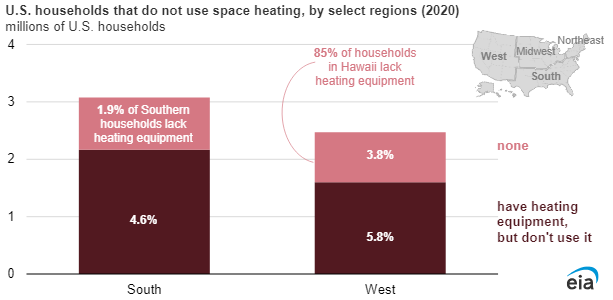
The further north you live, the more challenging heating your garage will be, especially during the colder months.
Here are some numbers showing how much heating you’ll need per square foot, assuming a well-insulated garage:
| Local Climate | Garage Heating Requirements |
|---|---|
| Hot climate (for example, Hawaii) | No heating |
| Moderate Climate (for example, Seattle) | 7 watts per square foot or25 BTU per hour per square foot |
| Cold Climate (for example, Maine) | 14 watts per square foot or50 BTU per hour per square foot |
Source: Howmuch.net
Let’s look at what that means for different garage sizes.
| Local Climate | Moderate | Cold |
|---|---|---|
| 1-Car Garage (240– 540 square feet) | 6,000–13,500 BTU per hour | 12,000–27,000 BTU per hour |
| 2-Car Garage (400–720 square feet) | 10,000–18,000 BTU per hour | 20,000–36,000 BTU per hour |
| 3-Car Garage (600–1,080 square feet) | 15,000–27,000 BTU per hour | 30,000–54,000 BTU per hour |
With these numbers, you’ll be able to properly size your system, be it a radiant heating system, a forced-air heater, or something else.
You should also note that if you’re running an electric heating system of more than 12,000 BTU per hour (3.5 kilowatts), you’ll probably need a 240 V or multi-phase electrical circuit.
How to Heat a Garage: 11 Options to Stay Warm
Turning your garage into a comfortable place during winter weather takes more than plugging in a space heater. It requires preparation and investment. Let’s dig into the steps you can follow if you want to transform your garage into a truly livable space year-round.
1. Start With Insulation
Without insulation, it’ll be tough to maintain a comfortable temperature inside your garage during the cold winter months. Even if you find the best way to heat a garage, all that heat will just end up outside.
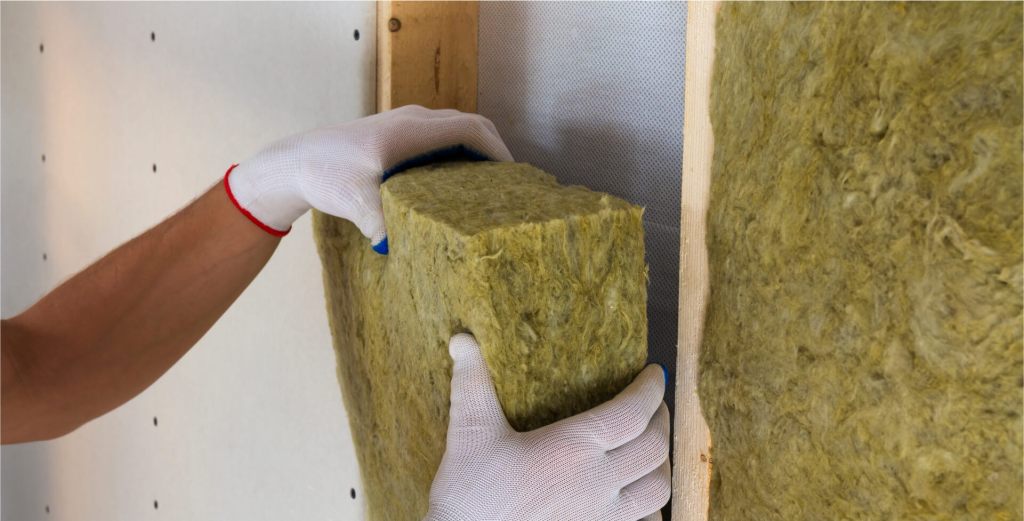
Proper insulation is key to preventing heat loss. While insulation doesn’t heat, it creates a barrier that helps keep the air inside the garage warm, keeps the cold air out, and allows the other heat sources to work more efficiently.
Insulation also comes in handy during the summer by keeping the garage cool.
Pros
Cons
2. Find and Seal Drafts
Full insulation is just the beginning. Any cracks or gaps in the insulation or around doors and windows can let cold air in, making your electric space heaters or whatever other option you use work harder.
An excellent way to heat a garage and keep it warm is to seal all drafts. Start by inspecting your garage for any gaps, cracks, or openings where cold air might be entering.
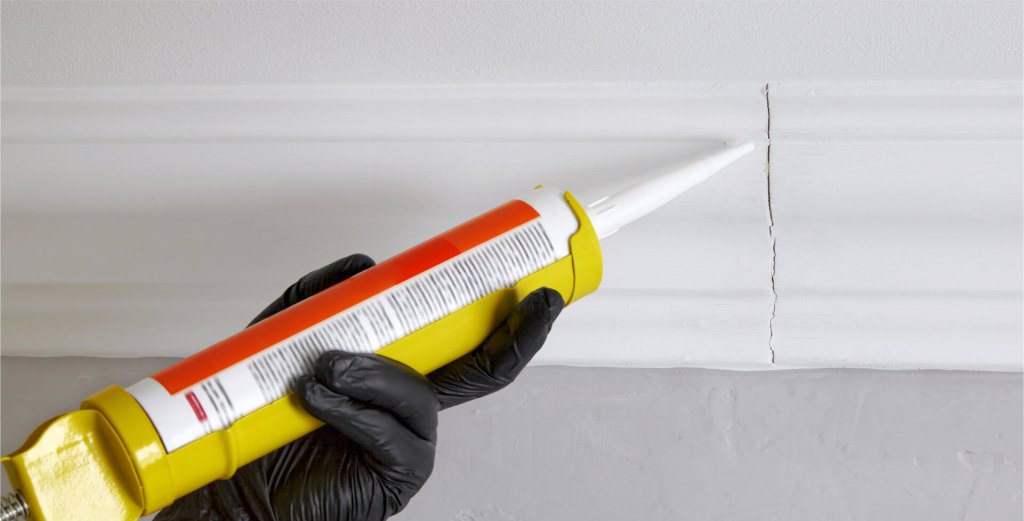
- Garage Doors: Ensure your garage door has proper weather stripping and insulation. Consider upgrading to an insulated garage door if yours is older or poorly insulated.
- Windows: Check for drafts around windows and apply weather stripping or caulk as needed.
- Walls and Ceiling: Inspect for any cracks or gaps in the walls and ceiling, and seal them with appropriate insulation materials.
- Exterior Doors: Ensure the door leading from your garage to your home is properly sealed with weather stripping.
By taking these steps to find and seal drafts, you’ll create a more comfortable and energy-efficient space, regardless of the heating system you choose.
Pros
Cons

3. Purchase a Convection Heater
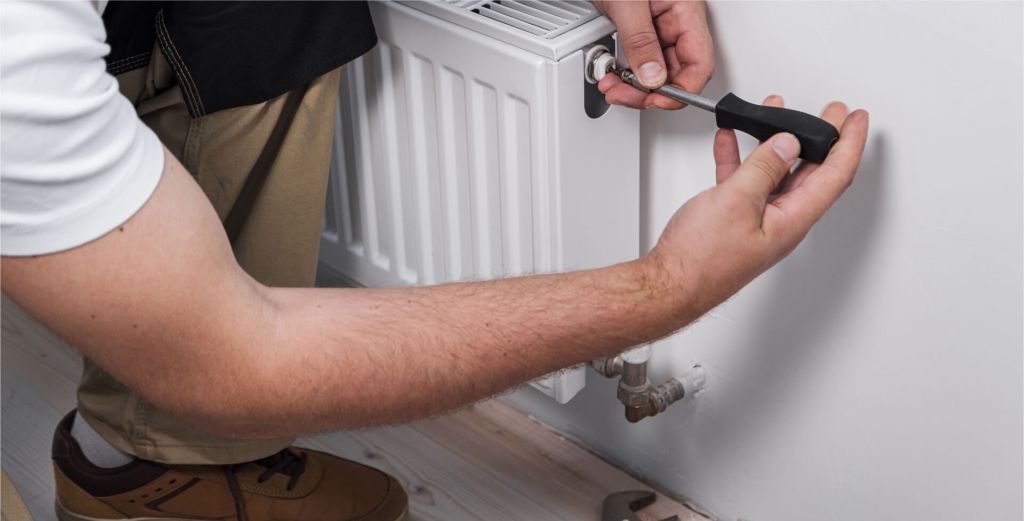
Convection heaters are a versatile heating option since their units can run on electricity, propane, or natural gas. They operate by heating the air around you through convection currents. Some units heat up fairly quickly, while others can take longer, depending on the appliance type and size.
Pros
Cons
4. Bring a Portable Space Heater
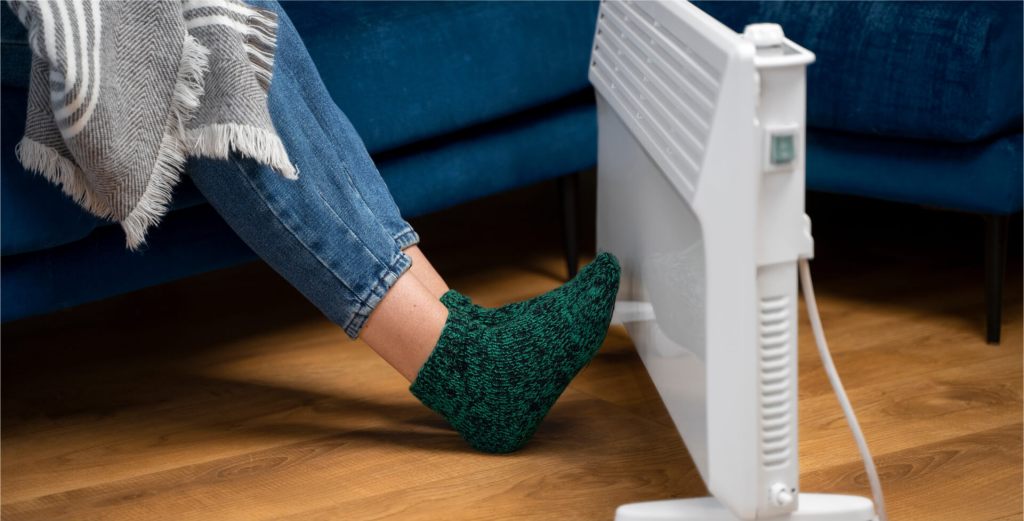
A portable space heater is a great option if you’re working in a smaller area. It’s a simple way to warm up on a chilly day and comes in many sizes that can fit any budget. Since the average space heater doesn’t warm up an entire space, you may need more than one, depending on the size of your garage.
Pros
Cons
5. Install Electric Ceiling Panels
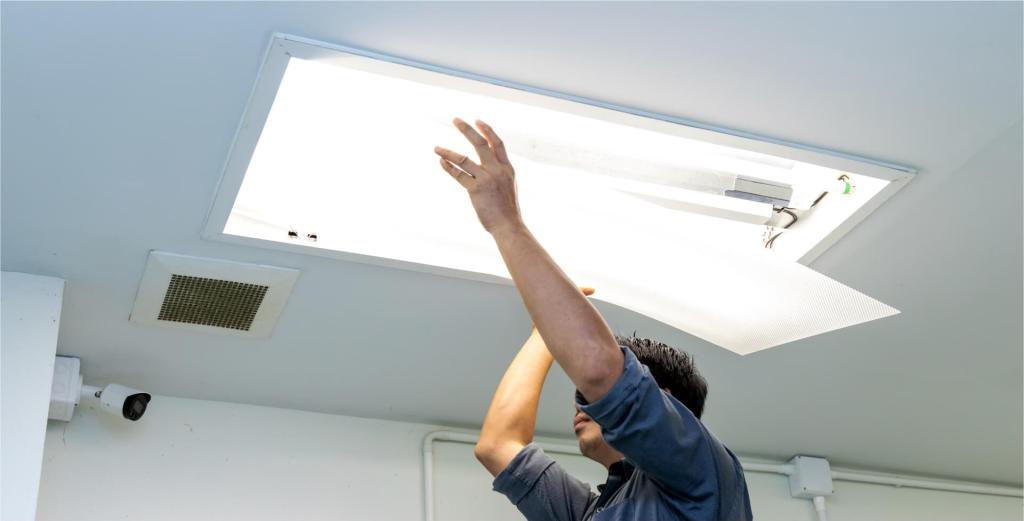
Electric ceiling panels are slim in design and a great option if you want to maintain floor space. Since they have a modern style, many people like to use them in living spaces. Electric ceiling panels are also energy-efficient, as they heat up and cool down quickly. Understanding that heat rises, however, your garage may still feel cold near ground level with this heating system.
Pros
Cons
6. Add a Floor Covering
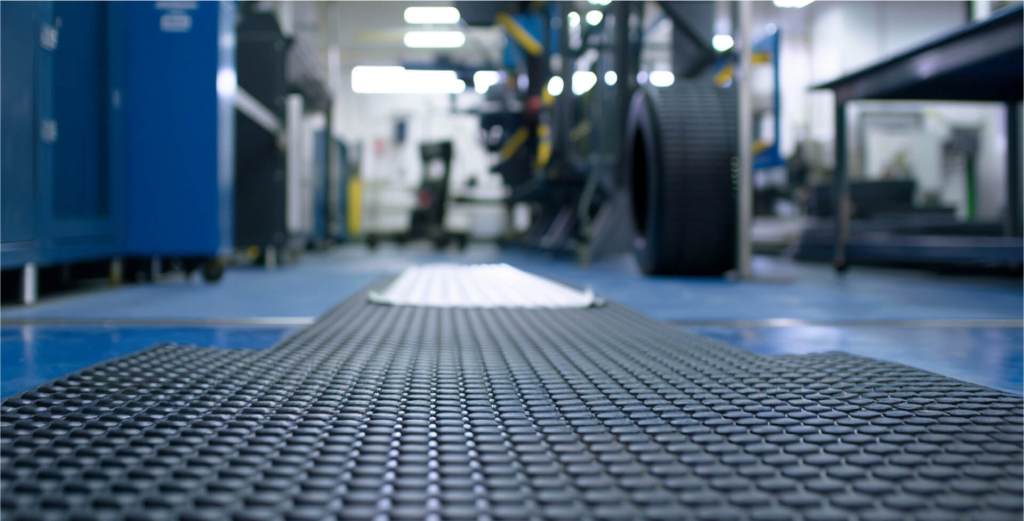
Heaters may warm the air around you, but the typical concrete garage floor still remains cold to the touch. This can be a problem if you kneel on the floor often when performing work on a vehicle or other projects.
Covering the floor with an outdoor or garage flooring mat is a quick and simple solution. These types of mats are generally waterproof and slip-resistant, and many versions come with a carpet-like feel for comfort.
Pros
Cons
7. Mount an Electric Heater
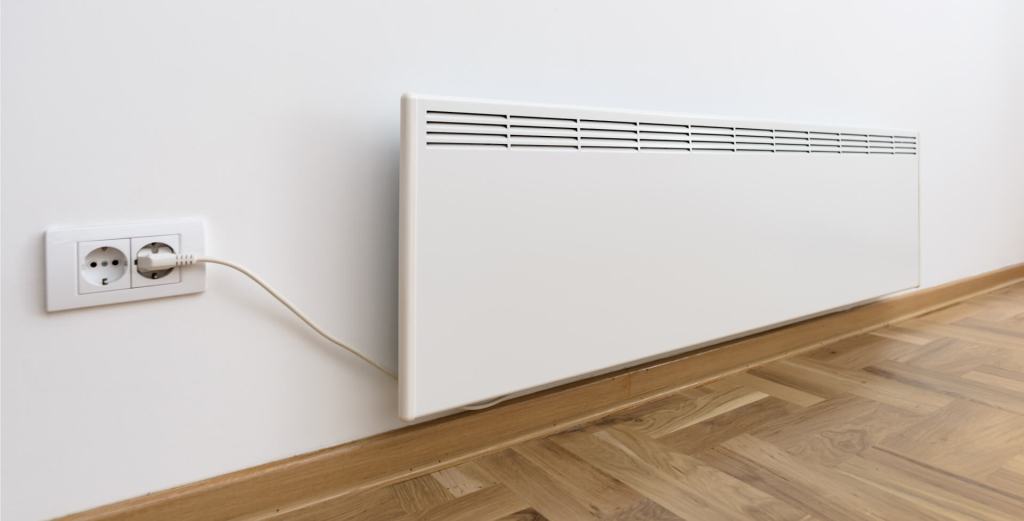
Wall-mounting an electric heater is easier to install than other heating systems. Electric heaters are bigger than space heaters, and they can come in handy in large garages. And since they’re mounted, you save floor space and the area is safer with pets or children around. The only downside is that using this type of heater consumes a lot of energy, which can result in high electricity bills.
Pros
Cons
8. Invest in a Heated Garage Floor
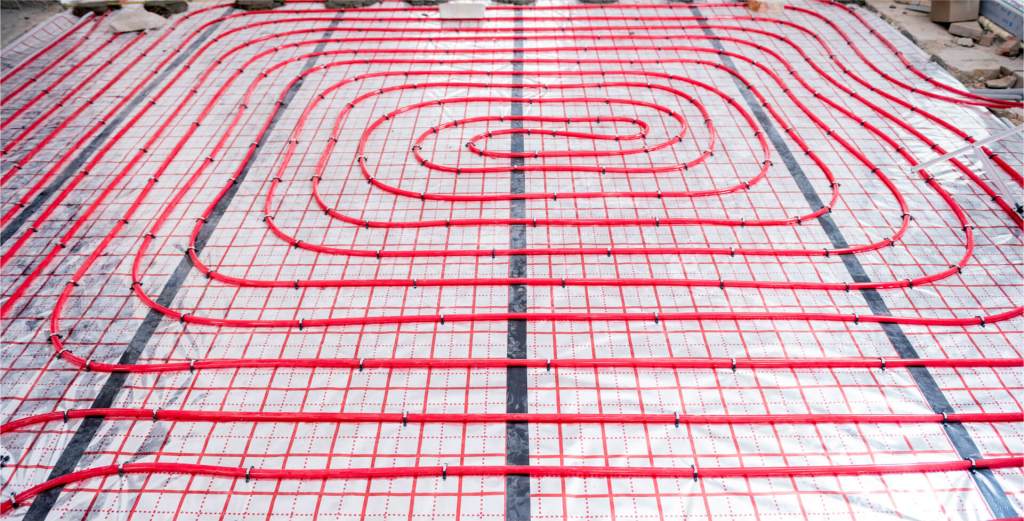
Heated garage floors have electrical panels beneath them that emit infrared radiation, heating the space from the floor up. This is more of a luxury option and is best for building a new garage.
If you try to install electric floor panels after construction, you’ll have to jackhammer out the concrete, install the system, and pour new concrete back on top. Installing it when you’re building the garage from scratch is a more affordable option.
Pros
Cons
9. Use an Infrared Heater
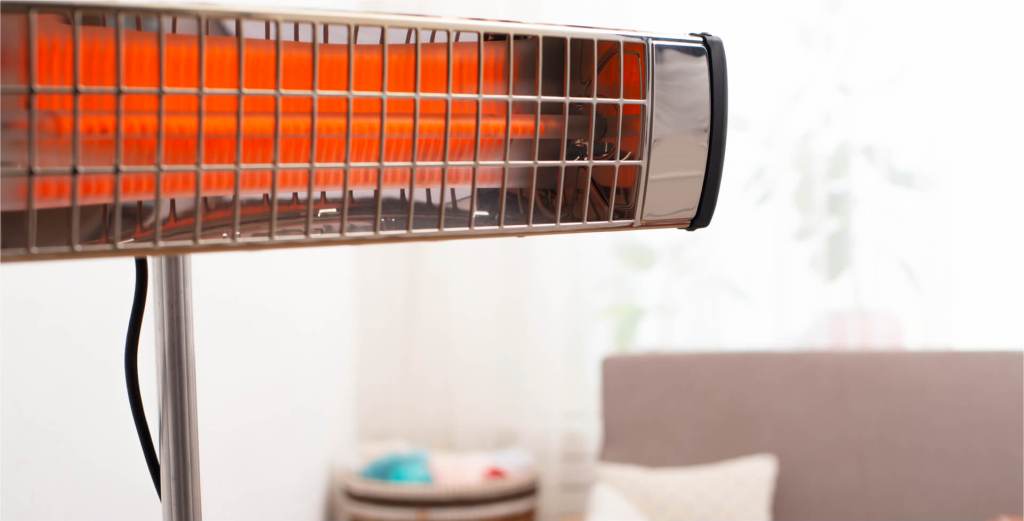
Infrared tube heaters will radiate heat throughout the space while consuming less energy than other heating units. This option doesn’t heat the air but instead heats objects around it. Best of all, they stay cool to the touch, making them a safe option for pets and kids.
Pros
Cons
10. Add a Mini-Split System
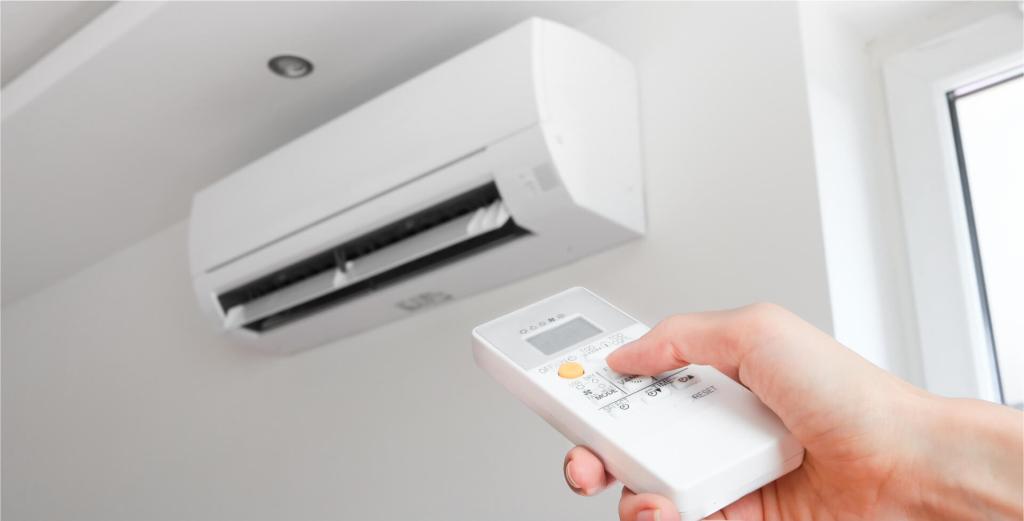
Also known as ductless systems, a mini-split is a single unit that heats and cools. They’re energy-efficient, help save money on utility bills, and offer the most flexibility. Ductless mini-split systems can recirculate the indoor air, helping keep the garage temperature levels comfortable no matter the season.
Pros
Cons
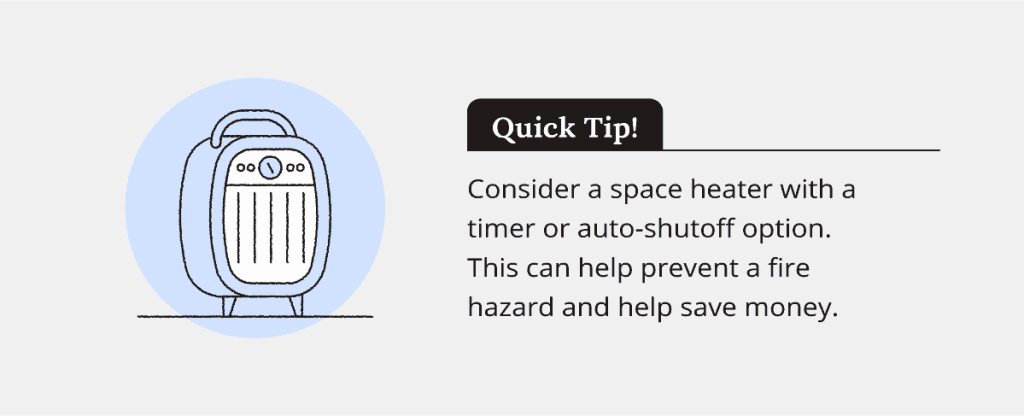
11. Install a Geothermal Heat Pump System
A geothermal heat pump system is an excellent, albeit more complex, option for the eco-conscious homeowner looking for a sustainable and highly efficient heating and cooling solution.

These systems leverage the constant temperature of the earth beneath the frost line to provide both heating in the winter and cooling in the summer.
Here is a summary of the pros and cons of installing a geothermal heat pump system:
Pros
Cons
There are two main approaches to consider for garage heating:
- Air-Source Geothermal Heat Pump: These systems function similarly to traditional mini split, but they’re more efficient because they exchange heat with the stable temperature underground rather than the fluctuating outside air.
- Geothermal Radiant Floor Heating: This luxurious option involves installing a network of pipes beneath the garage floor connected to a geothermal heat pump.
Understanding the Cost of Heating a Garage
Now that we’ve explored various ways to heat your garage, let’s consider how much they cost.
The cost of implementing these heating solutions can vary significantly depending on factors like the size of your garage, the specific product or system you choose, and whether you opt for DIY installation or professional help.
Here’s a breakdown of the estimated costs for the heating strategies we’ve discussed. To make comparisons easier, most price ranges are for 1.5 kW heaters (except for heat pumps):
| Garage Heating Strategies | Range | Average |
|---|---|---|
| Insulation | $0.47–$4.50 per square foot | $2.50 per square foot |
| Caulking the garage1 | $105–$290 | $197.50 |
| Weather Stripping2 | $125–$290 | $207.50 |
| Convection Heater3 | $150–$1,000 | $575 |
| Portable Space Heater4 | $125–$290 | $207.50 |
| Electric Ceiling Panels5 | $1,300–$2,340 | $1,820 |
| Floor Covering6 | $1.40–$6 per square foot | $3.70 per square foot |
| Electric Heater7 | $110–$750 | $430 |
| Heated Garage Floor8 | $7–$17 | $12 |
| Infrared Heater9 | $50–$600 | $325 |
| Mini-Split System10 | $2,000–$4,000 per ton | $3,000 per ton |
| Geothermal Heat Pump System11 | $2,500–$8,000 per ton | $5,250 per ton |
| Geothermal Radiative Floor Heater12 | $9.78–$11.25 per square foot | $10.52 per square foot |
Sources: 1Angi, 2HomeGuide, 3Angi, 4The Spruce, 5Howmuch.net, 6Home Depot, 7Home Depot, 8HomeGuide, 9Home Depot, 10HomeGuide, 11Angi, 12Green Wave
Cost of Insulation
Insulation costs depend on the square footage (walls and ceiling) you must insulate and the material you choose. Here’s a breakdown of typical insulation costs per square foot for 2025.
| Type of Insulation | Price Range (per square foot) |
|---|---|
| Double-Bubble1 | $0.47–$1.37 |
| Rigid Board Insulation2 | $0.60–$2.00 |
| Batt and Roll Insulation3 | $0.80–$2.60 |
| Spray Foam4 | $1.00–$4.50 |
| Woven Insulation5 | $3.00–$3.00 |
Sources: 1Amazon, 2HomeAdvisor, 3HomeGuide, 4HomeGuide, 5AFO
At those prices, insulating a garage can cost as little as $342 for a small 1-car garage with cheap insulation to $9,702 for a larger 3-car garage with closed-cell foam insulation.
Cost of Geothermal Systems
Geothermal radiant floor heating is a premium option with a higher upfront cost than other heating methods. The main system alone will cost $2,500–$8,000 per ton of heating or 12,000 BTU per hour. If you recall our previous table discussing how much heating you need, these prices translate to a system cost of $1,250 for a 1-car garage in mild weather to $36,000 for a large 3-car garage in a cold climate.
| Garage Size | Cost of a Geothermal System |
|---|---|
| 1-Car Garage | $1,250–$18,000 |
| 2-Car Garage | $2,080–$24,000 |
| 3-Car Garage | $3,125–$36,000 |
If you’re adding radiative floor heating, you’ll have to spend an additional $9.78–$11.25 per square foot for piping, installation labor, and connection to the geothermal heat pump.
ROI of Garage Heating: The Case for Geothermal
These systems aren’t cheap; they’re a premium, permanent solution to keep wood, vinyl, or concrete floors warm throughout the year.
But why would you spend upward of $40,000 on a heating system when there are so many other garage heating options, like portable heaters and wood stoves, that are a fraction of the cost?
Here’s the gist of it:
- Heaters spend energy to produce heat.
- Heat pumps only spend energy to move heat around.
So, while an electric heater will consume 10,000 kWh of electricity annually when heating your garage, a geothermal heat pump with an efficiency or COP of 4 will consume only 2,500 kWh for the same heating.
At an average electricity price of $0.18 per kWh (source: BLS), the heat pump’s greater efficiency can reduce your energy bill by $1,350 annually, paying for itself in the long run.
Frequently Asked Questions About the Best Way to Heat a Garage
Is a heated garage bad for cars?
There are many advantages to parking cars inside heated garages. They reduce the time spent warming up the car during freezing mornings and also help warm the oil, which keeps the engine lubricated in the winter.
The only thing to consider is if you drive on salty roads (which is common during winter). Salt can speed up the rusting process on your car when parked inside a warm and humid space, so it’s still important to wash and dry your car regularly during the winter season.
What temperature should a heated garage be?
The temperature of your garage depends on the climate where you live. A good rule of thumb is to keep it above the point that condensation forms, which is usually around 40 degrees Fahrenheit.
Is it safe to heat a metal garage?
One of the significant advantages of metal is that it is fire-resistant, making it safe to heat a metal garage. As long as the space is properly insulated and you follow all safety precautions of your heating system, you shouldn’t run into any issues.
Are propane heaters safe in garages?
Yes, propane heaters are safe to use in garage spaces as long as they are rated for indoor use and the garage is well-ventilated. Be sure to always follow the instructions and fire precautions.
If having an attached heated garage is too much of a hazard for your home, consider designing a detached garage instead. As a separate building from the house, it’ll be easier to customize and use as a workshop space.
With your heating preference in mind, you can use our 3D customization tool below to design the perfect insulated garage space.




